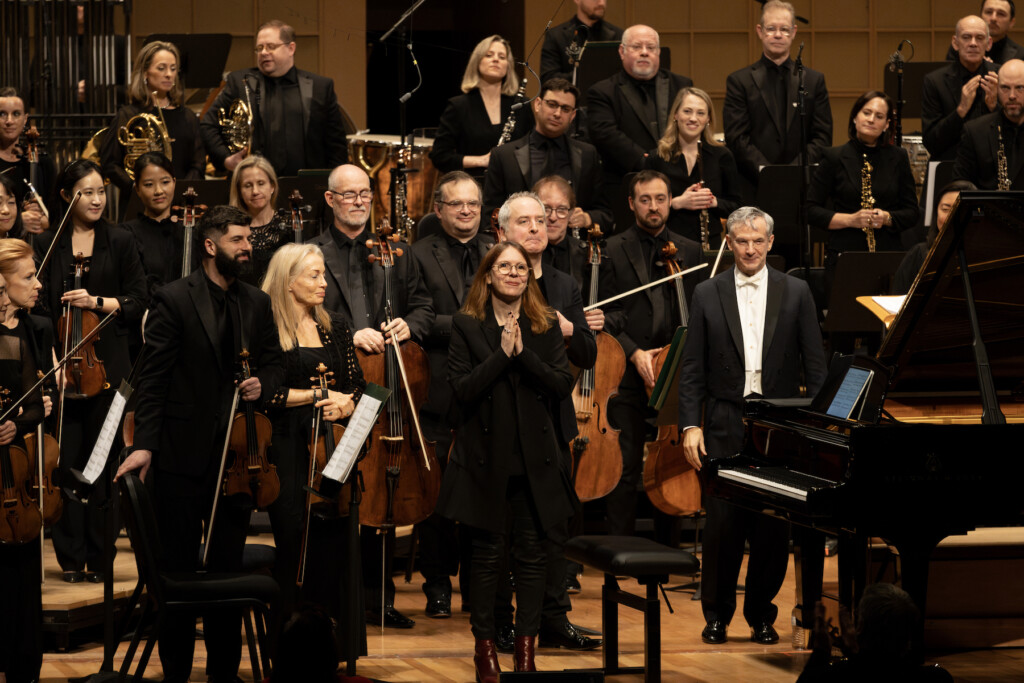The Dallas Symphony’s long history of supporting major new additions to its classical repertoire added a new chapter this weekend, with the debut of a big, cinematic piano concerto by the English composer Anna Clyne.
Titled ATLAS, the concerto is a major work, just short of a half-hour. It’s also a stylistic departure for Clyne. The composer got her start with minimalist techniques, electronic and electronic-inspired music, and frenzied beats. She wrote a short, early orchestral work, >>rewind>> (2005), that’s meant to sound like you pressed rewind on your CD player. She’s even collaborated with Thievery Corporation and Björk.
Clyne started to show a more expressive side mid-career, building up to her 2019 cello concerto, DANCE. (I’m not sure why her increased soulfulness correlates with a greater love of capital letters.) That work, in five short movements, suggested in its subtitles different emotionally charged moments to dance (“…in the middle of the fighting,” “…when you’re perfectly free”). Its recording has been streamed 10 million times on Spotify. That success seems to have inspired Clyne to spend more time working on larger-structured pieces. In comparison, ATLAS is more playful and rambunctious, but with brief episodes that verge on sentimental.
ATLAS is based on the works of German artist Gerhard Richter, but don’t expect realistic representations of specific paintings. Instead, Clyne gives us her impressions of ATLAS, a four-volume Richter retrospective book series containing more than five thousand of his sketches, drafts, and source material he used for inspiration. (The books cost $1,500, but there is an online archive version.) She’s thankfully compressed all those thousands to 28 sources for musical inspiration—about one per minute of music. The result, in her words, is “a musical montage and a lucid narrative.”
“Montage” is a great name for it. Themes and ideas bounce in and out of ATLAS. They’ll disappear and reappear, or be alternated, or be introduced by the piano and pop up in the orchestra later. Ideas recur across volumes, too, especially in the finale, which has as many callbacks as the end of a comedy special. These alternations and callbacks replace the more typical classical style of taking the same melody through a series of developments.
This is all especially true of Volume III, one of my favorite pieces Clyne has written so far. It has five main motifs: a duel between two snare drummers on either side of the stage, a romping waltz tune, a churchy-sounding tune with bells, a reflective slow bit, and a piano riff that sounds inspired by Bach and the baroque. The second time pianist Jeremy Denk plays the Bach tune, he jazzifies it—and then all the other ideas start crowding in, one after the other, in more and more rapid succession. It’s like a scene in The Bachelorette when all the guys keep interrupting each other to try to flirt with the girl.
Without knowing the source visuals, it’s hard to tell what all these different motifs represent, but musically the mosaic works—and you can always imagine your own pictures. The pianist gets a few showy solos, but mostly participates as an equal member in the collage.
The Dallas audience reacted audibly to two big moments. First, near the beginning, when Denk repeatedly slammed his elbows into the keys (in time with giant bass drum thwocks), I heard gasps and murmurs from among the rows of seats. The other big moment for the audience was the very ending of the piece. I was unconvinced by that ending at first: it calls back to previous tunes from the mosaic, suddenly deciding to end on a prankish revision of the Bach-ish theme. Then I realized that the emotional payoff had already happened, right before the end, so the actual conclusion—on a deliberately “wrong” chord, in the manner of Charles Ives—was just a little fun postscript. That “wrong” sound drew quite a few chuckles and whispers from the crowd.
Compared to Clyne’s previous work, ATLAS is bigger and more percussive but still heart-on-sleeve, with a slow portion (Volume II) that sounds like something from a Hollywood production. If any part is going to get 10 million streams on Spotify, it’s Volume II. The music is kind of cliched, to be honest—part tearjerker, part Philip Glass movie soundtrack—but a lot of people like that kind of thing, and even grouches like me will appreciate that it’s a moment of contrast in Clyne’s kinetic, high-energy soundscape.
As Clyne tackles bigger orchestral forms, her music is getting more cinematic and more emotional without sacrificing the manic energy and experimentation that made her such a promising newcomer 20 years ago. That’s an impressive leveling-up for an artist to accomplish. ATLAS won’t stop after its successful Dallas premiere. It’s also slated for performances in Birmingham (United Kingdom, not Alabama), Princeton, and Vail.
The Dallas Symphony recorded this weekend’s performances for eventual release on its house record label, DSO Live, which means audiences around the world will be able to download or stream it at their leisure. Stay tuned for more information on that. And keep an ear out, maybe, for Clyne to move on to even bigger things.
Author







